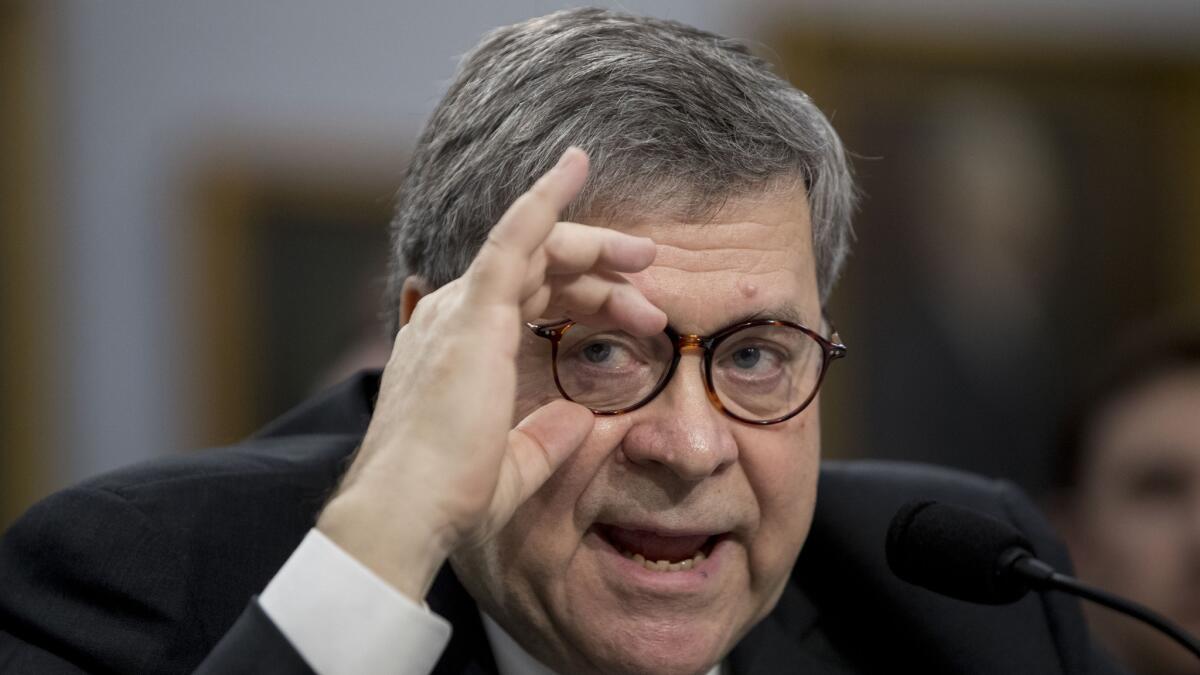Opinion: Bill Barr is acting like Trump’s wing man. Again

- Share via
In 2013 then-Atty. Gen. Eric H. Holder Jr., asked in an interview if he would be leaving the Obama administration, said that he would be staying because he liked what he was doing, and “I’m still the president’s wing-man, so I’m there with my boy.”
Some conservatives saw in that jocular comment an inadvertent admission that Holder put his loyalty to the president above his duties to the law. It was an unfair inference, but every attorney general must contend with suspicions that he’s politicizing the administration of justice in the service of the president who appointed him.
Then there’s President Trump’s second attorney general, William P. Barr. Far from acting in a way that would discourage such suspicions, Barr has exacerbated them.
Last year Barr seemed to second Trump’s complaint that his presidential campaign was spied on during the investigation of possible ties between the campaign organization and Russia. Barr told a Senate committee that “spying did occur.”
Barr later ordered an investigation into the origins of the FBI’s Russia investigation by U.S. Atty. John Durham of Connecticut — even though that issue was already being examined by Justice Department Inspector General Michael E. Horowitz. Durham’s inquiry has evolved into a criminal investigation.
Horowitz eventually reported that the investigation was opened with sufficient “predication” (or justification). Horowitz also said that his investigation didn’t find “documentary or testimonial evidence that political bias or improper motivation” influenced the opening of the probe.
Barr quibbled with that finding, saying that as he saw it, the report showed that “the FBI launched an intrusive investigation of a U.S. presidential campaign on the thinnest of suspicions that, in my view, were insufficient to justify the steps taken.”
Then came the coronavirus contagion. Barr has made it clear that he’s in sync with the president’s impatience with restrictions on public gatherings — including curbs recommended by Trump’s own administration. Barr has called restrictions “draconian” and suggested that they should be relaxed beginning May 1.
Earlier this month, Barr announced that the Justice Department was intervening in a lawsuit brought by a Mississippi church that was ticketed for holding a drive-in worship service.
On Monday, 10 days after Trump had tweeted out calls to “liberate” three states with Democratic governors from burdensome restrictions, Barr issued a statement urging federal prosecutors to “be on the lookout for state and local directives that could be violating the constitutional rights and civil liberties of individual citizens.” The statement didn’t offer any specific examples.
Freedom of speech and assembly, like the free exercise of religion, is protected by the U.S. Constitution, and it’s possible to imagine coronavirus restrictions so onerous, discriminatory or open-ended that a judge might find them unconstitutional.
But, given Barr’s history, his statement looks much more like a political document than the warning of a prudent law-enforcement official.
As a result, even if a situation arose in which the Justice Department had good cause to challenge a restriction on public gatherings, the natural reaction of many Americans would be that Barr was acting to serve the president’s “liberation” agenda — serving, in other words, as the president’s “wing man.”
More to Read
A cure for the common opinion
Get thought-provoking perspectives with our weekly newsletter.
You may occasionally receive promotional content from the Los Angeles Times.











